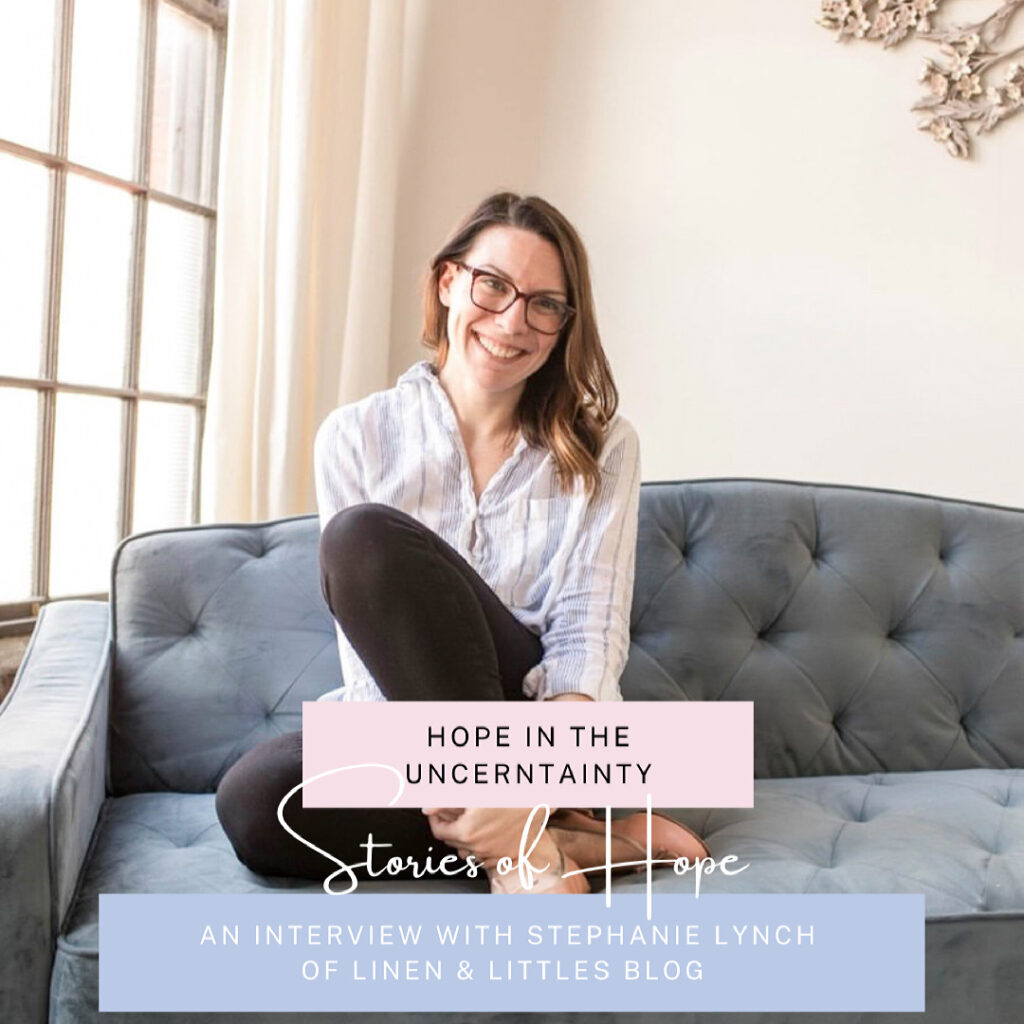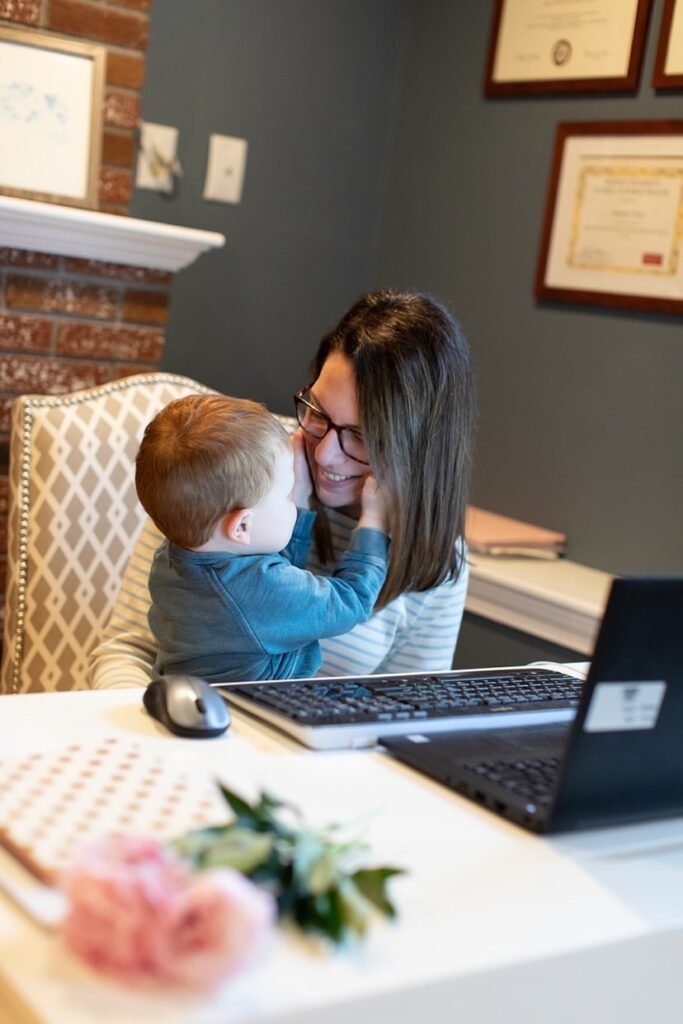
When I decided to start the Stories of Hope series, I immediately knew I would interview Stephanie of Linen and Littles Blog. We "met" through social media several months ago and immediately connected over being working moms, a shared sense of humor, and a common outlook on many things.
Stephanie was diagnosed with Multiple Sclerosis as a young college student. My work as a therapist has given me a small insight into what life with a chronic illness can be like and I've always been so inspired by Stephanie's ability to share about her invisible illness (meaning she does not "look sick") in a way that feels authentic, honest, and uplifting all at the same time.
Stephanie and I had a long Facetime call before I sent her these questions. Our conversation and her words here have reminded me of several things that I will not soon forget--to live with compassion in my heart, because I never know what may be going on with another person. To teach my child to live with that same sense of empathy. To honor my own limits instead of working against them. And that simply asking a friend "how are you" and really listening to the answer is much more significant than having the perfect words to say.
I'm so honored to share Stephanie's story with you. I know you'll be encouraged and inspired by her.
Tell us a bit about yourself and your family?
I am a wife and mother to two beautiful little boys. My husband, Tim, and I have been married for almost 6 years and together for almost 10. Our boys are 18 months apart and we’re in the thick of the toddler years - our oldest will be 3-and-a-half this month, and our youngest will be 2 the week after! I am also a working mother. I have a Master’s in Public Health with a concentration in Maternal & Child Health Epidemiology, and I work full-time in Clinical Research.

You were diagnosed with MS when you were in college. Will you tell us a bit about MS? What was it like when you received your diagnosis?
Multiple Sclerosis is a chronic neurologic autoimmune disease. People with MS experience a wide variety of symptoms depending on which parts of our brain and spinal cord are affected by the breakdown that occurs as a result of the disease. At this point, the cause of MS is not known and there is no known cure, but treatment options have come such a long way even since I was diagnosed 11 years ago.
I was lucky, if it’s possible to think of it that way, that I was diagnosed very quickly. In hindsight, I had been having symptoms for a few years that were always attributed to something else - a pinched nerve, Mono, stress, you name it. When my symptoms couldn’t be explained by anything else, I had an MRI and was diagnosed that night. My two biggest questions when I was diagnosed were whether I could have children and if I would eventually need a wheelchair. My only exposure to MS up until my diagnosis was a family friend who uses a wheelchair and was not able to have children, so I was not sure what to expect. I was diagnosed over Christmas break my sophomore year of college and came back to Boston to start my semester a few weeks later. As overwhelmed as I was, I was also determined to continue to live my life as I always had - and I’ve learned a lot along the way by trying to do that.
What is it like to have an invisible chronic illness? What do you want others to know about this?
Having an invisible illness, particularly one that is as variable day-to-day as MS is, can be really challenging. Not “looking sick” is something that I’m grateful for in many ways, but also leads to situations where I feel I need to justify things like my handicap parking sticker, accommodations at work or school, and my cane. Some days it feels like I’m hiding a big secret because I feel well enough that I think it’s not obvious to people who don’t already know, and I can almost pretend it doesn’t exist. There are other days that it feels like it’s on full display because of the way I’m walking or the way it effects my speech, and these days sometimes come right after a day that it’s not necessarily obvious and then there are other questions to answer.
As a person living with an invisible illness, I am also, many times, responsible for explaining what my disease is, how it “works”, and how my symptoms affect my life. That being said, I think one of the things I would love for people to know about invisible illness is that it’s always ok to ask. If you’re not sure how a friend with an invisible illness is feeling, ask. If you’re not sure what words to use or how to support them, just ask. Living with an invisible illness can mean that saying “I’m having a rough day” can feel really hard, and “just checking in” is always appreciated.
You have two young boys. How does MS impact you as a mother? Do you see the boundaries that you set for yourself positively influencing your boys?
My MS impacts every aspect of my life, especially my motherhood. There, quite honestly, are things I just am not able to do. I am not able to jump on a trampoline, run around the backyard for more than a few minutes, or take my boys to the beach by myself. There are also daily opportunities for my boys to learn empathy, to learn from the example their father sets of supportive partnership, and the critical need for open lines of honest communication about our needs. I hope that the boundaries I’ve needed to set around what we’re able to do in a day or times that we need to change our plans because I’m not feeling well are influencing my boys in a positive way. I’m sure there will be hard conversations and questions as they get older, but right now I’ll take the “how are your legs today, Mama?” each morning from my sweet 3-year-old as a sign that he is developing a deep sense of compassion.

What led you to start sharing about MS online?
When I was first diagnosed, I couldn’t find any information that felt relevant to me personally. Since most people are diagnosed with MS in at least their 40s, it was hard to find connections with people with MS in my same stage of life. I thought if I was looking for these types of connections, some other people might be, too, so I decided to start sharing a bit about what my life with MS looks like. I began sharing when my youngest son was an infant, so I shared a lot about MS in pregnancy, postpartum, and breastfeeding at first, and what I share has naturally evolved as my boys have grown.
What gives you hope?
The sense of community I have found through sharing some of my experience has given me immense hope. Just knowing that there are other mothers of young children and women my age facing some of the same things that I do and are always ready to listen, answer a question, or offer support is so comforting. I’m also hopeful about the direction that conversations surrounding chronic illness are going. Topics that were considered taboo not long ago are now encouraged in so many families and circles. I would love to help develop a sort of curriculum or educational series about talking to toddlers and young children about chronic illness in the future. I am very hopeful that open conversation about topics like chronic illness will only encourage the next generation to be more empathetic, compassionate, and kind.
How would you encourage someone newly diagnosed with MS?
I would encourage anyone newly diagnosed with MS to take some time to re-learn their body. I struggled at first with not wanting to “slow down” and wanting to prove, in a way, that I could still do all the things I could before - and, turns out, that wasn’t the best idea at the time. I would also encourage someone newly diagnosed to celebrate every little victory. A new medication works well, that’s a victory. A walk around the block was easier today than it was yesterday, that’s a victory. There are certainly days, weeks, and months that this is much easier said than done, but it has definitely helped me to remember that not every setback is permanent and there are plenty of really good days.
How can friends and family be an encouragement to someone newly diagnosed with a chronic illness?
I think the most encouraging thing a person can do to support a loved one who is facing a new diagnosis is allowing space for every feeling. There are days when a new diagnosis feels overwhelming, there are days it feels like an opportunity to do good, and there are days it just plain stinks. Phrases like “it could always be worse” or “I know someone who had that and she’s fine!” can make it harder to express a frustration or sadness about a symptom or circumstance, so I would encourage friends and family to instead ask a simple “how are you?” and let the newly diagnosed person express themselves as freely as they feel comfortable to. A listening ear is often the most encouraging kind of support.
